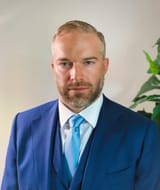Beyond Wealth
Redefining Success Through Community and Legacy

In life, we often seek guidance and inspiration from role models who embody qualities we admire. While no role model is perfect, we can isolate and learn from the traits that resonate with us. As we grow and evolve, different aspects of a particular role model may speak to us at different times, reflecting our changing values and priorities. This evolution can have a profound impact on our lives, influencing the experiences we seek and the paths we take.
For myself, the qualities I admire today are quite different from those I've admired in the past. In fact, they are entirely different than I ever imagined them to be. I've always idolized success and achievement, but my feelings about what constitutes success have shifted. Lately, I've found myself looking for inspiration for deeper truths and more robust forms of fulfillment rather than the simplistic form of monetary wealth. In my eyes, there are no better examples of this — at least in the sports world — than my two current favorite athletes: Rich Froning and Scottie Scheffler.
Having CrossFit and golf athletes at the top of my list may seem odd, but I enjoy watching the sports I participate in most. I train CrossFit almost 5-6 times a week and try to play golf 1-2 times a week. Of course, they both came to my attention because of their excellence, but that isn't what has kept my intrigue and respect.
What I find particularly impressive about Rich and Scottie is that, beyond their exceptional skills, they exhibit qualities that I deeply admire. They are both very humble and soft-spoken, though fiercely competitive. They also generally take the high road and objectively seem to be great people. They both care deeply about family and are great fathers. They are also deeply religious, often citing glorifying God as the reason for their perseverance.
Unlike Scottie, who remains humble and low-key despite being considered the best player in the world, Rich's personality shines through in his online presence. Through his YouTube channel, we get a glimpse into his life beyond the sport, and I've found myself drawing inspiration from how he balances his passions and priorities. As I've grown older, I've begun to reflect on how to apply similar principles to my life, with the most important being how he prioritizes his community.
Rich still lives where he grew up in Cookeville, Tennessee. He has a close family, a loving wife, and three adopted children. Few knew of Cookeville before Rich Froning. With a population of under 40,000, it is not a place you'd expect to be the center of a fitness movement. However, because of Rich, Cookeville has become the Mecca of CrossFit. He has built enormous gyms where athletes and fans from far and wide come for the chance to train with him or to say they have trained at his gyms. It continually pushes out the best athletes in the sport who come and train under his tutelage. This influx creates an industry of its own. He's also been able to expand into other areas he's passionate about and started those businesses right there as well.
This dedication and commitment to his hometown inspire me in a way I didn't expect. I similarly grew up in a small town in central Massachusetts but always had a different idea of my future. I never envisioned anything for me there. As I became a young adult, I couldn't imagine doing anything other than leaving and never returning. I scoffed at how there was very little to do and how no one seemed to have any ambition for anything grander. I figured that to get this "greater success," I had to leave. Rich's journey has made me second guess this entirely, as he almost makes me ashamed of abandoning the place where I spent my formative years.
But why? What is it about these actions that inspire me? It's not like Rich is preaching anything; as a matter of fact, he is very much going about his life and not imposing anything on anyone.
Reflectively, I believe it relates to something I learned from Jordan Peterson regarding how to make actual change in the world. He was always very antagonistic toward those who were depressive, disorganized, and lost in their personal lives but felt they needed to lecture others about how to solve the grander problems we face collectively as a society. He always recommended starting small and working inward before addressing these larger issues. He popularized the phrase 'clean your room,' which emphasizes personal responsibility and incremental progress. This approach starts with small, manageable tasks and builds up to larger ones, much like the concept of induction in computer science. For instance, the idea of 'cleaning your room' can be applied both literally and metaphorically. It means taking care of your personal space and life, ensuring they are organized, in order, and even beautiful. Once you feel you have control over those things, you work outward to your home, maybe a relationship, then your immediate family, then your friends, then your community, and larger till you feel you can positively impact broader society. You cannot simply skip to the last step. You grow and mature at each stage so that you have the experience and empathy to successfully facilitate change rather than be an authoritarian tyrant shouting at others what they must do.
Froning encompasses this beautifully. He has left his mark on the town and made positive changes to improve Cookeville, placing it on the tongues of people who otherwise would be completely oblivious. Something about this behavior calls to me in a profoundly spiritual way. I have no idea what Cookeville was like before Rich, but something is captivating about taking ownership, leaving your mark, and making it more beautiful for everyone. In the grand scheme, true success is measured not just by personal achievements but also by the positive impact we have on our community and loved ones. Is a man truly successful if he doesn't leave a positive mark on the places he's been?
To contrast this sentiment, I can't help but think of how I felt the last time I visited my hometown. Last year at Christmas, I drove around and was very disappointed with what I saw. I even wrote about it, explaining how I was disgusted and frustrated by how it was declining. In the piece, I asked the question, how do we turn this deterioration around? Well, I think I answered that question. It takes people giving a damn about having a positive impact on their communities, myself included. If my hometown is a dump, it is my duty to rectify that. It's empowering because it gives you agency when I felt there was no reason to have any.
As I've grown older and reflected on my values, I've realized that this evolution in my thinking results from maturity. I've begun prioritizing the long-term impact I can have on my community and the world around me. By no means am I moving back to my hometown anytime soon, but I certainly feel this newfound duty or obligation to make it a priority. Living where you can best thrive is still critical, but I must do this while also remembering where I came from and the longer-term picture that the positive change could have for future generations. Will Cookeville be a fitness center for generations to come? Maybe. But if it does, the people will always remember who put it on the map. I think the lesson there is good for everyone to ponder. We can't live exclusively on the backs of those who came before us. It is up to all of us to build on our ancestors' hard work, each working toward improving the immediate places around us. If even a tiny proportion of individuals took on this responsibility, it would likely have a significant positive impact on our communities.
My definition of success has evolved beyond mere wealth and material possessions. If I can achieve the things I want to achieve, it should be reflected in the positive change of the people and places that shaped me, improvements that can hopefully last and inspire generations. That is the best indicator of success, living breadcrumbs encapsulating the journey and how you did your small part to improve the world around you along the way.





